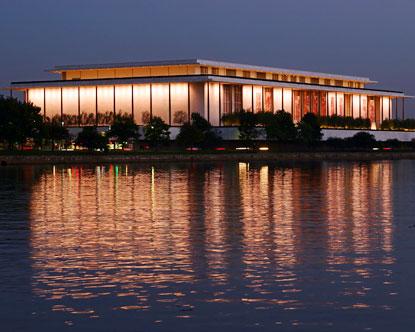“You’re going to see a lot of uniforms tonight,” a Kennedy Center rep told us before we joined the rest of the audience for “9/11: 10 Years Later, An Evening of Remembrance and Reflection” at the Concert Hall Thursday evening.
Indeed there were. The audience and the stage were resplendent with the presence of firemen, first responders and policemen from the area, as well as military personnel from all branches of the services. We all gathered for the grandest of music, the saddest of strings, plain and simple words from poets, the words of the men and women who wrote the stories to describe that history-changing, horrible and shocking day ten years ago.
Everyone—the dignitaries, three former Secretaries of State, the horn blower, the singers, the musicians and the attendant men and women in uniform, the flag bearers among them—were in a great company of ghosts that went beyond the 2,000 or so seats in the concerts. The ghosts were the losses of 9/11 and all their loved ones and Americans the country over who witnessed their destruction in one way or another.
If the occasion and the concert did not alleviate the pain of the memories, the music, words and company were salve for the soul, and the pomp—a full orchestra amid hanging, spectacular curtains and flags —certainly suited the circumstances.
Everyone wore some form black or gray, even actress Melissa Leo who recited two touching and plain-spoken poems, although she was all in satin and sparkles befitting an Oscar winner. Former Secretary of States Colin Powell, Madeleine Albright and Condoleeza Rice all read from news reports of the time. A trio of first responders recalled in halting and vivid words their own experiences in the midst of soot and calamity.
On the tenth anniversary, those things deserved and needed to be remembered. The Kennedy Center had put on two previous such concerts, one in the immediate aftermath to soothe a shocked nation, another a year later. The homegrown, superstar soprano Denyce Graves, who sang at the second concert, appeared again in regal style, singing an old spiritual, “City Called Heaven.”
The National Symphony Orchestra, under the baton of John Mauceri, performed “Adagio for Strings,” the most stirring, powerfully sad funeral and grieving music of the day.
Emmylou Harris, her hair as white as prophet now, sang a work by Stephen Foster, the 19th Century’s musical pop poet of America, a work with the ironic (for an audience keenly aware that President Barack Obama had just given a jobs speech in hard times in front of a Joint Session of Congress only moments ago) title of “Hard Times Come Again No More.”
Then it was Leonard Cohen, another American songwriter-poet, whose “Hallelujah” could be called a triumphant lament, a song which got an impassioned workout by Raul Esperanza who went searching for every feverish emotion in the lyrics and found them, and perhaps a few more.
But it was jazz trumpeter and jazz icon Wynton Marsalis who struck a balance, remembering and looking ahead, then and now with a muted horn and trumpet. He walked on stage early in the proceedings, but it was the archangel like blast of the trumpet that you heard first, and he moved across the stage like a wounded older man, the trumpet emitting at times shrieking anguish before settling for calls to heaven and the community. Returning near evening’s end, the tone was jauntier, the trumpet fairly bounded with sounds that encouraged hopeful dancing, high-stepping, looking back a little, but insisting there was a dance to be danced and songs to be sung yet.
It was the tone that was perfect for now: honor the memory each and every one of the lost ones honor the bravery of that day that erupted spontaneously out of character, but look ahead, for these are times in need of a hopeful future.


